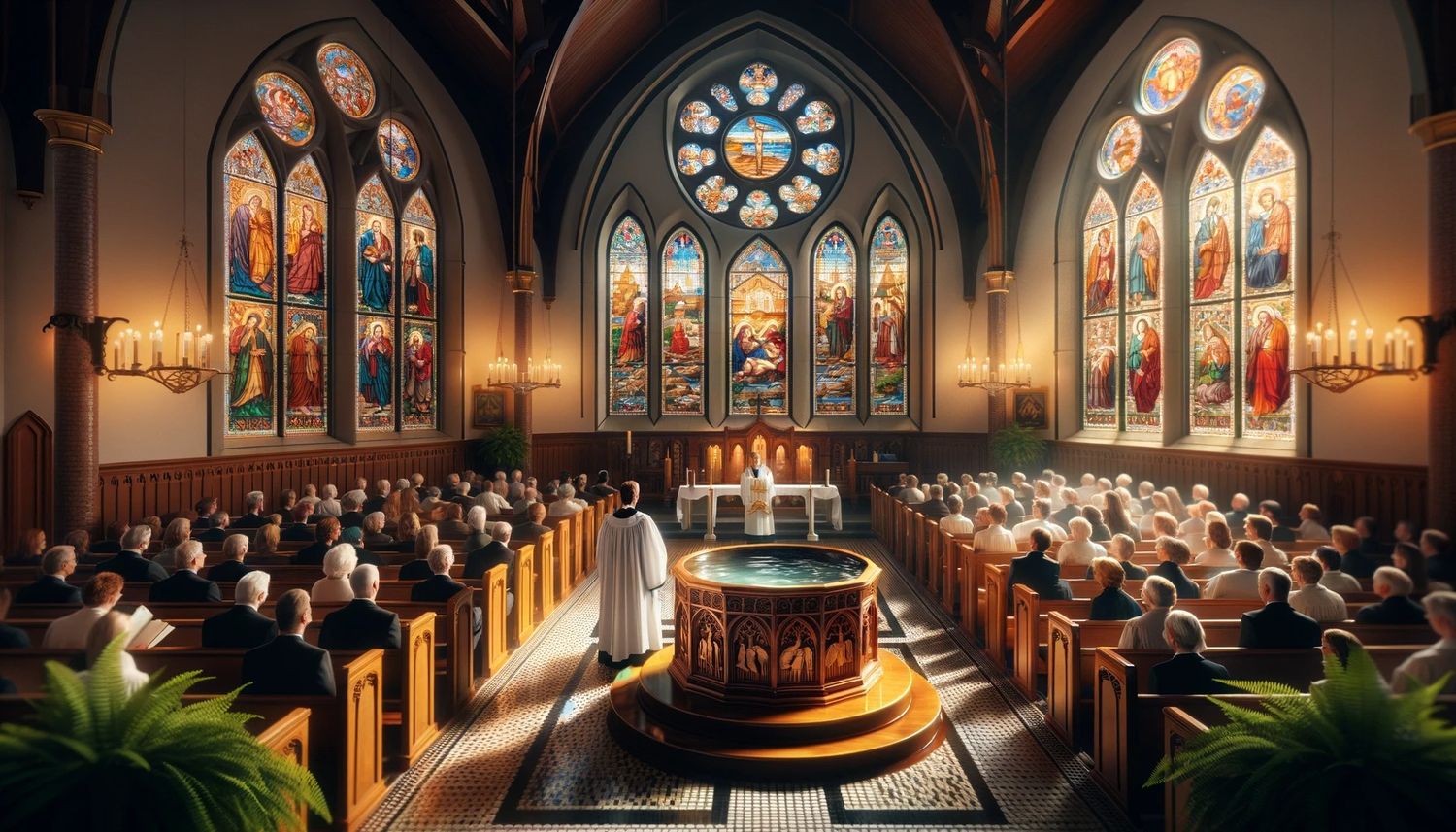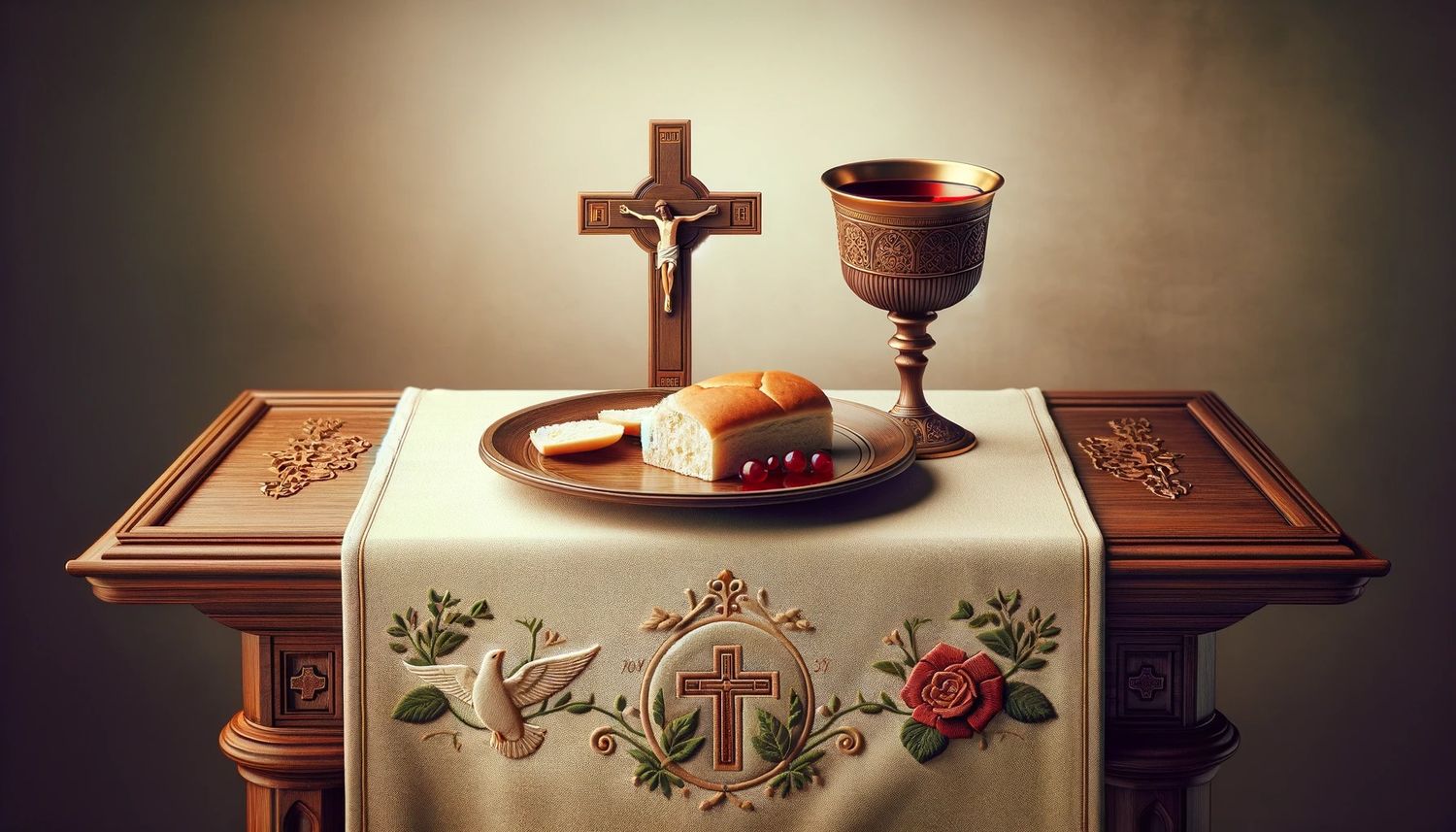Home>Theology and Spirituality>What Do Jehovah’s Witnesses Believe About Communion


Theology and Spirituality
What Do Jehovah’s Witnesses Believe About Communion
Published: February 24, 2024
Jason DeRose, Managing Editor at Christian.net, uses his expertise in religion and journalism to deepen understanding of faith's societal impacts. His editorial leadership, coupled with a strong academic background, enriches the platform’s diverse content, earning him recognition in both journalism and religious circles.
Discover what Jehovah's Witnesses believe about communion and their theological perspectives on this important spiritual practice. Explore their unique approach to theology and spirituality.
(Many of the links in this article redirect to a specific reviewed product. Your purchase of these products through affiliate links helps to generate commission for Christian.net, at no extra cost. Learn more)
Table of Contents
Introduction
Communion, also known as the Lord's Supper or the Memorial, holds profound significance in the beliefs and practices of Jehovah's Witnesses. This sacred ritual is a cornerstone of their faith, symbolizing their devotion to God and their unity as a spiritual community. Understanding the beliefs and practices surrounding communion is essential for gaining insight into the spiritual life of Jehovah's Witnesses.
The commemoration of the Last Supper, as observed by Jehovah's Witnesses, is a deeply reverent occasion that reflects their commitment to following the teachings of Jesus Christ. It serves as a poignant reminder of the sacrificial death of Jesus and the hope of salvation that it offers to humanity. As we delve into the intricacies of Jehovah's Witnesses' beliefs about communion, we will uncover the profound symbolism, the frequency of observance, and the active participation of adherents in this solemn ceremony. Let's embark on a journey to explore the spiritual depth and significance of communion in the faith of Jehovah's Witnesses.
The Importance of Communion in Jehovah's Witnesses' Beliefs
The observance of communion holds profound significance within the beliefs of Jehovah's Witnesses. It is a solemn occasion that serves as a tangible expression of their faith and devotion to God. For Jehovah's Witnesses, communion represents a sacred bond with God and a reaffirmation of their commitment to living in harmony with the teachings of Jesus Christ.
At the core of Jehovah's Witnesses' beliefs is the recognition of Jesus Christ's sacrificial death as the means of salvation for humanity. The commemoration of the Last Supper, where Jesus instituted the observance of the bread and wine, is a poignant reminder of his selfless act of love and the hope it brings to mankind. This act of remembrance is central to the spiritual identity of Jehovah's Witnesses, reinforcing their belief in the redemptive power of Christ's sacrifice.
Furthermore, communion serves as a unifying force within the community of Jehovah's Witnesses. It fosters a sense of solidarity and spiritual connection among believers, emphasizing their shared faith and common purpose. The act of partaking in communion symbolizes the unity of believers as they come together to honor Jesus Christ and his role in their lives.
In essence, communion is not merely a ritualistic practice for Jehovah's Witnesses; it is a deeply meaningful and personal expression of their faith. It underscores their unwavering trust in God's promises and their dedication to upholding the principles set forth in the Scriptures. Through the observance of communion, Jehovah's Witnesses reaffirm their allegiance to God and their reliance on the redemptive work of Jesus Christ.
The importance of communion in Jehovah's Witnesses' beliefs extends beyond the physical act of partaking in the bread and wine; it encapsulates their spiritual conviction and unwavering commitment to living in accordance with the teachings of the Bible. As we delve deeper into the symbolism and significance of the bread and wine in communion, we will gain a deeper understanding of the spiritual richness embedded within this sacred observance.
The Symbolism of the Bread and Wine
Central to the observance of communion among Jehovah's Witnesses is the profound symbolism associated with the bread and wine. These elements hold deep spiritual significance, representing fundamental aspects of their faith and the teachings of Jesus Christ.
The unleavened bread, used during the commemoration, symbolizes the body of Jesus Christ, which he offered as a sacrifice for the sins of humanity. This symbolism harks back to the Last Supper, where Jesus broke the bread and instructed his disciples to partake of it, signifying the sharing in his sacrificial death. For Jehovah's Witnesses, the bread serves as a poignant reminder of Jesus' selflessness and the redemptive purpose of his death. It underscores their belief in the atoning value of Christ's sacrifice and the hope it brings for forgiveness and reconciliation with God.
Likewise, the wine, or unfermented grape juice, represents the shed blood of Jesus Christ, which forms the basis of the new covenant between God and humanity. Just as Jesus instructed his disciples to drink from the cup during the Last Supper, Jehovah's Witnesses partake of the wine as a symbolic act of sharing in the benefits of Jesus' sacrificial death. The wine serves as a powerful emblem of the forgiveness of sins and the promise of eternal life through the redemptive work of Christ.
The symbolism of the bread and wine in communion is deeply rooted in the foundational tenets of Jehovah's Witnesses' faith. It encapsulates the core principles of redemption, forgiveness, and spiritual renewal through the atoning sacrifice of Jesus Christ. As Jehovah's Witnesses partake of the bread and wine, they do so with profound reverence, acknowledging the profound significance of these elements in reaffirming their faith and commitment to God.
In essence, the symbolism of the bread and wine in communion serves as a tangible expression of Jehovah's Witnesses' unwavering trust in the redemptive power of Jesus' sacrifice. It reinforces their spiritual connection to Christ and their dedication to living in harmony with the teachings he imparted. Through the observance of communion, Jehovah's Witnesses embrace the profound symbolism of the bread and wine, finding spiritual nourishment and reaffirming their allegiance to God and His Son, Jesus Christ.
The Frequency of Communion Observance
The frequency of communion observance holds significant importance in the spiritual practices of Jehovah's Witnesses. Unlike some Christian denominations that observe communion weekly or monthly, Jehovah's Witnesses commemorate the Lord's Evening Meal once a year, following the biblical precedent set at the Last Supper.
This annual observance aligns with the timing of the Jewish Passover, as Jesus instituted the Lord's Evening Meal during the Passover celebration. For Jehovah's Witnesses, this timing is deeply symbolic, as it underscores the parallel between the sacrificial lamb of the original Passover and the redemptive role of Jesus Christ. By observing the Lord's Evening Meal annually, Jehovah's Witnesses honor the scriptural basis of this commemoration and emphasize its profound significance in their faith.
The annual observance of communion also serves as a time of reflection and spiritual renewal for Jehovah's Witnesses. It provides an opportunity for believers to engage in self-examination and introspection, as they reflect on their relationship with God and their adherence to the teachings of Jesus Christ. This period of self-reflection fosters a deep sense of spiritual introspection and reaffirms their commitment to living in harmony with their faith.
Furthermore, the annual observance of communion underscores the solemnity and reverence with which Jehovah's Witnesses approach this sacred ritual. By designating a specific time each year for the commemoration, Jehovah's Witnesses emphasize the gravity and significance of the Lord's Evening Meal. This deliberate approach underscores the profound respect and veneration with which they regard this observance, reinforcing its central role in their spiritual lives.
In essence, the annual frequency of communion observance among Jehovah's Witnesses serves as a poignant reminder of the sacrificial death of Jesus Christ and the hope it offers to humanity. It provides a dedicated time for believers to reaffirm their faith, reflect on the redemptive significance of Christ's sacrifice, and strengthen their spiritual bond with God and fellow believers. Through this deliberate and reverent approach to communion observance, Jehovah's Witnesses uphold the sacredness of this ritual and honor its profound symbolism within their faith.
The annual observance of communion stands as a testament to the deep spiritual significance and reverence with which Jehovah's Witnesses approach this sacred ritual, reinforcing its central role in their faith and spiritual identity.
The Participation of Jehovah's Witnesses in Communion Services
The participation of Jehovah's Witnesses in communion services is characterized by deep reverence, spiritual significance, and a profound sense of unity within the community of believers. Central to their observance of communion is the act of partaking in the unleavened bread and unfermented wine, which symbolize the body and blood of Jesus Christ, respectively. This act of partaking is reserved for those who are considered to be of the "anointed" class, comprising a specific number of Jehovah's Witnesses who believe they are destined for heavenly life. The selection of individuals to partake in the bread and wine is based on their personal conviction of being called to heavenly life, and it is regarded as a deeply personal and spiritual matter.
For Jehovah's Witnesses who are not part of the "anointed" class, the observance of communion holds equal significance. While they do not partake in the bread and wine, they actively participate in the commemoration by attending the memorial event and engaging in heartfelt reflection on the significance of Christ's sacrifice. This inclusive approach underscores the unity and spiritual solidarity among Jehovah's Witnesses, as all members of the faith come together to honor and commemorate the sacrificial death of Jesus Christ.
The communion service itself is conducted with solemnity and reverence, reflecting the deeply held spiritual convictions of Jehovah's Witnesses. The event typically takes place after sunset on Nisan 14, according to the Jewish calendar, and is held in Kingdom Halls, which are the places of worship for Jehovah's Witnesses. The atmosphere is one of quiet reflection and contemplation, as believers gather to remember and honor the profound significance of Jesus Christ's sacrifice.
The participation of Jehovah's Witnesses in communion services extends beyond the physical act of partaking in the bread and wine; it encompasses a spiritual communion with God and a reaffirmation of their faith and dedication to living in harmony with the teachings of Jesus Christ. Through their active involvement in the commemoration, Jehovah's Witnesses express their unity as a spiritual community and their unwavering commitment to upholding the principles of their faith.
In essence, the participation of Jehovah's Witnesses in communion services is a deeply personal and communal expression of their faith. It serves as a poignant reminder of their spiritual identity and their shared belief in the redemptive power of Jesus Christ's sacrifice. The observance of communion unites Jehovah's Witnesses in a common bond of faith and devotion, underscoring the profound significance of this sacred ritual within their spiritual journey.
Conclusion
In conclusion, the observance of communion holds profound significance within the beliefs and practices of Jehovah's Witnesses. The annual commemoration of the Lord's Evening Meal serves as a poignant reminder of the sacrificial death of Jesus Christ and the hope it offers to humanity. The symbolism of the bread and wine in communion encapsulates the core principles of redemption, forgiveness, and spiritual renewal through the atoning sacrifice of Jesus Christ. This sacred ritual underscores the unwavering trust of Jehovah's Witnesses in the redemptive power of Jesus' sacrifice and reinforces their spiritual connection to Christ and their dedication to living in harmony with his teachings.
The annual frequency of communion observance among Jehovah's Witnesses provides a dedicated time for believers to reflect on the redemptive significance of Christ's sacrifice and strengthen their spiritual bond with God and fellow believers. This deliberate and reverent approach underscores the profound respect and veneration with which they regard this observance, reinforcing its central role in their spiritual lives.
The participation of Jehovah's Witnesses in communion services, whether through partaking in the bread and wine or engaging in heartfelt reflection, exemplifies their unity as a spiritual community and their unwavering commitment to upholding the principles of their faith. The observance of communion unites Jehovah's Witnesses in a common bond of faith and devotion, underscoring the profound significance of this sacred ritual within their spiritual journey.
In essence, the beliefs and practices surrounding communion in the faith of Jehovah's Witnesses reflect a deep reverence for the sacrificial death of Jesus Christ and a profound commitment to living in accordance with his teachings. The observance of communion serves as a tangible expression of their faith, symbolizing their devotion to God and their unity as a spiritual community. It is a solemn occasion that reinforces their belief in the redemptive power of Christ's sacrifice and the hope it brings for forgiveness, reconciliation, and eternal life.














